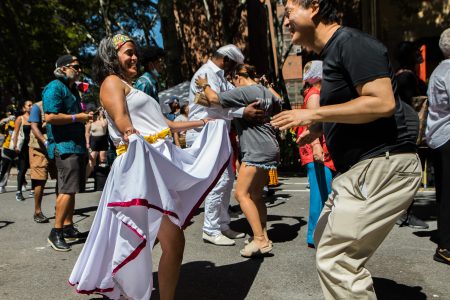A newly released 20-image photo dossier by the Islamic State Mozambique Province (ISMP) documents a chilling wave of violence targeting Christian communities. The materials depict militants executing over 30 civilians through beheadings and close-range gunfire, while entire villages are razed, and churches and homes are set ablaze in a ruthless campaign.
This latest atrocity is not an isolated incident. Northern Mozambique, particularly the Cabo Delgado province, has been under siege for years by Islamist militants who aim to impose their ideology across Africa. With setbacks in Afghanistan, the Philippines, and other regions, Africa has emerged as the primary arena where ISIS can operate almost freely, echoing its reign in Syria and Iraq during its peak. So long as ISIS thrives in Africa, the dream of a “Global Caliphate” remains alive.
Targeted Attacks on Christian Communities
The wave of violence has specifically targeted Christians. Villages such as Chiure-Velho, Nacocha, and Macomia have been attacked repeatedly, with civilians separated from the population and executed based solely on their faith. The ISMP’s photo dossier leaves no ambiguity: homes, churches, and schools are burned; civilians are decapitated or shot at point-blank range; and entire communities are left in terror.
According to verified reports, more than 30 Christians were beheaded, while countless others were injured or abducted. The attacks are methodical, suggesting a clear ideological mission rather than random violence or economic disputes. In many cases, militants identify Christian households before launching their attacks, underscoring that this is targeted persecution for religious reasons.
The brutality is compounded by the destruction of physical infrastructure. Churches and schools, often the centers of community life, are intentionally destroyed. Homes are torched, leaving families homeless and vulnerable. In some instances, militants force survivors to witness the killings of their neighbors, further amplifying the psychological trauma.
Displacement and Humanitarian Crisis
The consequences of these attacks are staggering. Over 50,000 individuals have fled their homes, seeking refuge in safer areas. Among them, nearly 60% are children, according to the International Organization for Migration. Families are living in overcrowded temporary shelters, often with limited access to food, clean water, and medical care.
The social and psychological impact on these communities is immense. Children have witnessed extreme violence, while adults grapple with the loss of loved ones, property, and livelihoods. Entire villages are now depopulated, leaving behind a landscape marked by fear and destruction. Humanitarian agencies warn that without immediate intervention, the suffering will worsen as displaced populations face disease, malnutrition, and further attacks.
Islamist Motivation and Ideology
The motivation behind these attacks is not ambiguous. ISMP militants operate under the banner of ISIS and allied jihadist networks, armed with military-grade weapons and guided by a clear religious ideology. Their mission is to eradicate Christian presence in northern Mozambique and expand Islamist influence across Africa.
Yet, instead of confronting the Islamist nature of this violence, some governments and international observers have attempted to reframe it as a dispute between farmers and herders or as a local conflict over land and resources. This narrative is not only misleading—it is dangerous. Northern Mozambique’s coastal war zones have no cattle herders, and the attackers are organized ISIS brigades, not local communities fighting over property.
By calling jihadist massacres “land conflicts,” officials deflect blame, protect foreign investment, and avoid scrutiny. This misrepresentation serves the interests of radical Islamists, corrupt governments, and apologists who downplay the ideological reality of these atrocities. Denying the Islamist motivation is effectively excusing the attacks and ensuring that communities continue to be slaughtered for their faith.
International Response and Concerns
The international response has been limited and largely humanitarian. The European Union has pledged aid worth millions of dollars, yet critics argue that the assistance falls short of addressing the root causes. While food, shelter, and medical aid are critical, they do not confront the militant threat or hold perpetrators accountable.
Some global actors have publicly condemned the attacks, but few have acknowledged the specific Islamist nature of the violence. By failing to confront the ideological driver of these atrocities, the world risks allowing ISMP and similar groups to consolidate control, recruit fighters, and expand their operations across Africa.
Broader Implications for Africa
Mozambique is part of a larger pattern of Islamist insurgencies across the continent. With ISIS suffering defeats in Afghanistan and the Philippines, Africa has become the primary region where militants can operate with relative impunity. Northern Mozambique is now effectively a testing ground for ISIS-affiliated brigades to refine tactics, spread propaganda, and terrorize local populations.
If left unchecked, the ISMP campaign could destabilize neighboring regions, create refugee crises, and inspire further attacks across Africa. Radical Islamists are exploiting weak governance, corruption, and security gaps to advance their objectives. Northern Mozambique is just one example of a broader ideological struggle, where civilians—especially Christians—are targeted solely because of their faith.
Urgent Need for Action
The ongoing persecution of Christians in Mozambique demands immediate attention. Governments, international organizations, and humanitarian actors must recognize the ideological nature of the threat and respond accordingly. Failure to do so risks allowing militants to continue their campaign of terror and displacement, turning entire regions into strongholds for ISIS-affiliated groups.
The world cannot remain passive as communities are decimated for their beliefs. A coordinated effort—including military, humanitarian, and diplomatic measures—is necessary to protect vulnerable populations and restore stability in northern Mozambique. This is not merely a regional issue; it is a global moral responsibility.
Conclusion
Over 30 Christians have been brutally murdered in northern Mozambique, their villages destroyed, and their communities terrorized. The Islamic State Mozambique Province continues to operate with impunity, exploiting governance failures and international inaction. The attacks underscore the urgent need for a global response that acknowledges the Islamist nature of the violence and provides both immediate protection and long-term solutions. The people of Mozambique are enduring a silent genocide, and it is imperative that the world responds decisively.
Featured image credit: DepositPhotos.com








